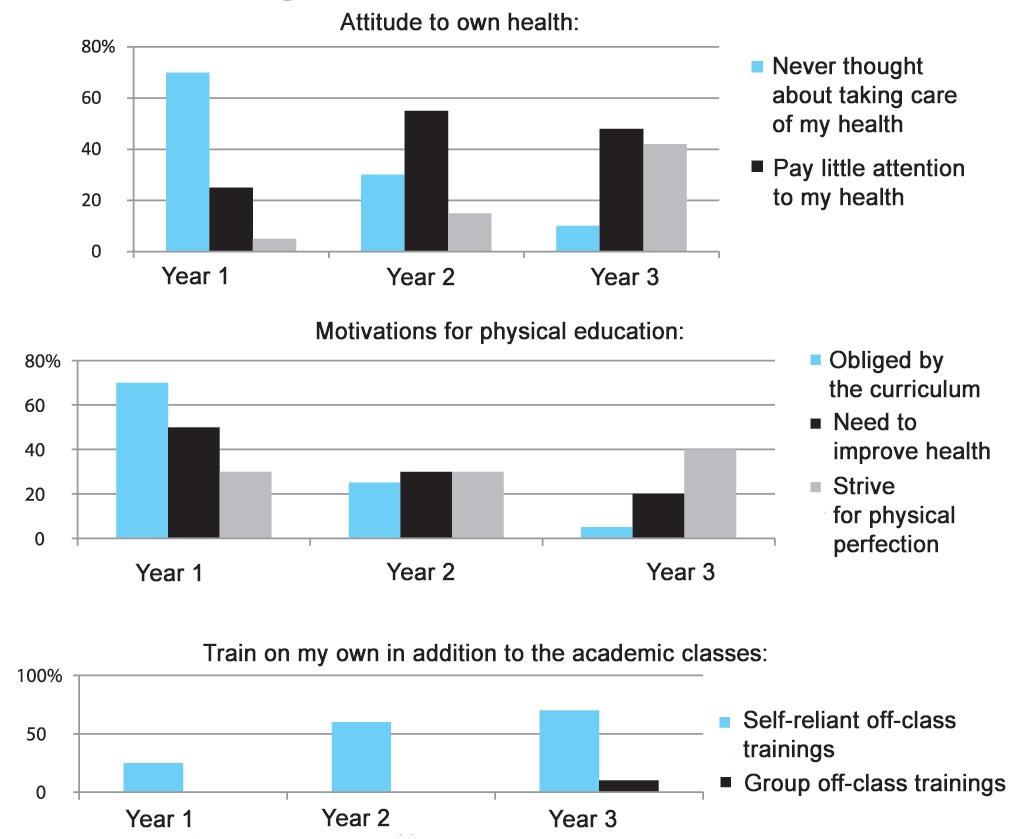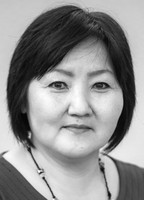Education model for physical progress of health-deficient students
Фотографии:
ˑ:
PhD, Associate Professor M.I. Sentizova1
A.V. Guryeva1
E.I. Savvinova1
A.G. Barakhsina1
1Institute of Physical Culture and Sports of Ammosov North-Eastern Federal University, Yakutsk
Keywords: special health group, differentiated approach, values, motivations, recreational physical education, self-rehabilitation.
Background. National universities admit, on a yearly basis, certain percentages of health-deficient students subject to the special physical education curricula that deserve to be thoroughly analysed. As demonstrated by the practical experience, the health-deficient students’ morbidity rates may be scaled down and their intellectual and physical working capacity may be improved when their physical education is duly designed and managed. Therefore, the health-deficient students’ adaptation to academic physical, intellectual and mental stresses needs to be ranked among the top priority issues by the academic management, and the issues need to be addressed throughout the study period.
Objective of the study was to analyse benefits of a special physical education course in application to the health-deficient students attributed to special health groups.
Methods and structure of the study. Benefits of the special recreational physical education course in application to the special health group students were tested at the Physical Education Department of Ammosov North-Eastern Federal University. This study applied the test data as of 2014-16 to analyse the benefits of the special recreational physical education course in application to the special health group students. Subject to the experiment were 73 first- to third-year students (21 young men and 52 young women) of Medical Institute and the Philological Department. Practical goal of the experiment was to develop and implement a special recreational physical education course to be applied to the special health group students.
Study results and discussion. The experimental study was designed to consider the ways to apply special education conditions to facilitate training of the special health group students. A sociological analysis under the study was geared to profile the students’ morbidity rates versus academic education loads, nutrition, day regimen and lifestyles, and resulted in the following findings:
- 48% of the students enlisted in the academic recreational physical education groups had been exempted from the school physical educations lessons and attended them only occasionally and, hence, were found underdeveloped, unknowledgeable and unskilled in the physical education basics;
- The students' inactivity in the sports and health domains heavily contributed to the negative effects of hypodynamia on their bodily systems; and
- Poor knowledge and skills in the healthy lifestyle related aspects were found of aggravating effect on the chronic diseases and provoking new diseases.
Having analysed the study data, we found the following: necessary design forms and conditions of the special recreational physical education course in application to the special health group students; the ways to improve their motivations for healthy lifestyle; developed a special recreational physical education course in application to special health group students; and tested its benefits by an experiment.
The special recreational physical education course makes a special emphasis on due motivations for the healthy lifestyles being cultivated in students based on conscientious attitudes to their own health; and offers the ways, conditions and tools for the special physical training and rehabilitation procedures applicable also in the post-disease/ injury/ surgical operation periods.
The theoretical knowledge on the basics of physical culture and hygiene obtained in the course made it possible to cultivate conscientious attitudes to own health in the trainees. They mastered a set of special disease-specific exercises contributing to the relevant tempering and morning gymnastic practices. The education course gives, in addition to the theoretical knowledge of the physical training basics, practical knowledge and skills in the self-training process design and self-control domains, with the relevant training and relaxation process management skills.
One of the key specifics of the special physical training systems applied to the health-deficient students is that the physical loads are to be duly dosed and managed on an individual basis. The individualised special physical training process management implies not only the training scope and intensity being controlled but also special practices customised to morphological and functional disorders of every student being applied so as to reasonably ease the burden on the malfunctioning/ pathological systems/ organs with a relatively high-intensity training of the relatively healthy bodily systems.
The individualised physical training process design needs to include a prudent process strategy and tactics plus the best forms of the student-educator cooperation process. It is via such education process driven by a productive student-educator relationship that the following is attained: the student shows progress in the self-reliance aspects, in the conscientious personal development process; develops reasonably high adaptability to education process conditions; maintains comfortable individual education pace and progress with the optimal resource mobilisation rate; flexible design of the education process content; due integration of the education process forms; and high-quality outcomes of the education process.
The special physical education process conditions offer a variety of physical load management scenarios customisable for individual physical, somatic, mental, spiritual and ethical health/ development conditions of each trainee to attain the relevant cultural, health improvement, cognitive, corrective and rehabilitative process goals.
Practical sessions are designed to help the students obtain due knowledge and master different practical skills in the physical improvement process with due account of the individual needs and conditions of the trainees. The practices are reasonably versatile in the difficulty levels and categories to help master different motor skills, develop and correct certain physical qualities versus diagnoses and physical abilities of each student. The customised physical training process design and management encourages students to be creative and show initiative in their own health improvement process. The health-deficient students’ interest in the training sessions is further stimulated by a wide range of practices including training stimulators, swimming, and special exercises with variable elements from shaping, aerobics, yoga, Wushu, Quigong etc.
A special emphasis in the special physical education course is made on the diagnosis-specific training practices to facilitate adaptation of one or another unhealthy bodily organ to physical loads. The special practices (particularly jumping and running ones) may be limited or totally excluded when they may provoke acute conditions of some diseases including pyelonephritis, arthritis, cystitis, hepatitis etc. A high priority is given to certain muscle group building practices including dorsal, abdominal and limb muscle groups. The training process scopes and intensities need to be managed on an individual basis. A special care needs to be taken in managing the strength physical practices on a strictly individualised basis with a prudent selection of the physical action intensity, scope and pace, plus the rest breaks as required by the diagnosis, contraindications and trainee's feelings.
We have applied a few standard functionality tests (breath-holding tests, Martine, G.L. Apanasenko’s express tests etc.) to rate the students’ health conditions prior to and after each semester including their muscular performance rates and motor skill levels. Given in Table 1 hereunder are the special health group students’ physical progress test rates.
Table 1. Special health group students’ physical progress test rates as of 2014-16
|
Test rate |
First academic year |
Third academic year |
|
Resting HR, bpm |
65-90 |
60-90 |
|
Catarrhal diseases per year
|
3-6 |
2-3 |
|
Chronic diseases |
One plus |
One plus |
|
Systemic physical training experience |
No experience: 62% Occasional: 25% School PE lessons: 13% |
Self-trained: 68% Group-trained: 32% (special health groups) |
|
Recovery time after 20 squats per 30 s |
Longer than 3 min: 27% 3 min: 73% |
2-3 min: 75% 1-2 min: 25% |
|
Strength endurance tests: - Pull-ups on a horizontal bar, men - Hanging on a horizontal bar, women, s - Prone push-ups, men - Prone push-ups from a 30-cm bench, women - Back-down prone trunk lifting
- Squats (reps) |
2-3 reps 10-15 s 4-8 reps
0-3 reps 10-20 reps, men 5-10 reps, women 20-30 reps |
6-9 reps 30-55 s 8-10 reps
6-9 reps 22-30 reps, men 12-18 reps, women 30-40 reps |
|
Flexibility test: bends forward |
0-15 cm |
18-23 cm |
As shown by the above data, the special health group students had made a progress in their health conditions for the three academic years as verified by the physical condition test rates.
The special physical education course for health-deficient students was found to facilitate the students’ health motivations and values being improved by the physical training practices, as demonstrated by the following study data: see Table 2.

Ris. Special health group students’ progress in the health motivations and values as of 2014-16
The special physical education course for health-deficient students includes sets of training scenarios customised for individual diagnoses and developmental needs of the trainees.
Conclusion. Based on a prior study data, we developed the special physical education course to improve health of the health-deficient students with a set of special physical education process conditions established for the special health group students. The set of the special physical education process conditions to facilitate the special physical education course made it possible to attain the following benefits:
- The training course helped the health-deficient students make notable physical progress as verified by the physical progress test rates given herein in Table 1;
- The health-deficient students acquired good knowledge of their own bodily specifics and developmental needs; and mastered basics of the special physical training techniques and practices to improve their health conditions; and the progress facilitated their health motivations and values being built up: see Table 2; and
- The set of special physical education process conditions and practices made it possible for the students to improve health by the special physical training and recreational practices with due day regimen and nutrition management.
References
- Zhmykhova A.Y., Erokhina O.E., Burov A.E. Soderzhanie professionalnoy fizicheskoy kultury studentov spetsialnoy meditsinskoy gruppy [Content of professional physical education for special health group students]. Vestnik sportivnoy nauki, 2012, no. 4, pp. 5-7.
- Shil'ko V.G., Shil'ko T.A., Guseva N.L. Pedagogicheskie tekhnologii v fizkulturno-sportivnoy deyatelnosti studentov [Educational Technologies in Physical Culture and Sports Activity of Students]. Teoriya i praktika fiz. kultury, 2014, no. 11, pp. 52-53.
- Platonova R.I., Kolodeznikova S.I., Sentizova M.I. Obshchepedagogicheskie problemy teoreticheskoy i prikladnoy podgotovki bakalavrov v usloviyakh realizatsii FGOS 3 [General pedagogical issues of theoretical and applied Bachelor training within FSES 3+]. Teoriya i praktika fiz. kultury, 2015, no. 10, pp. 7-8.
Corresponding author: fizkult@teoriya.ru
Abstract
The article considers the educational conditions needed to be established for physical education of health-deficient students (attributed to special health groups). Objective of the study was to test by an experiment the special physical education process efficiency in application to the health-deficient students of Medical Institute and the Philological Department. The proposed recreational physical education model efficiency was tested on the special health group students of the Physical Education Department of Ammosov North-Eastern Federal University. Subject to the experiment were 73 first- to third-year students (21 young male and 52 female students) of Medical Institute and the Philological Department.
The study data and analyses demonstrated that the proposed recreational physical education model with its sets of general and special health practices is beneficial as verified by the improved students’ health rates depending on the actual diagnose and helps step up their intellectual and physical working capacity. Practical educational experience of the model application shows that the efficient practices help normalize functions of different body systems, facilitate the learning progress and build up skills and abilities in the special health group students.




 Журнал "THEORY AND PRACTICE
Журнал "THEORY AND PRACTICE